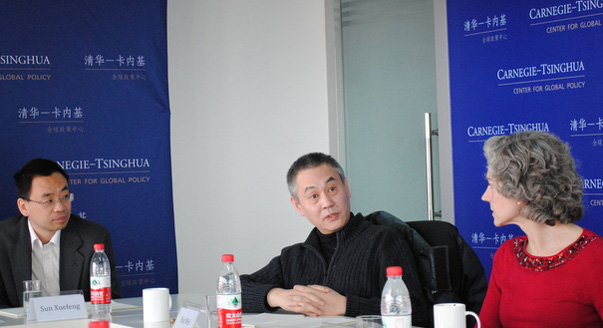Registration
You will receive an email confirming your registration.
China holds a critical role in overcoming the major global issues of 2013, ranging from climate change to nuclear security to the global economy. The Carnegie-Tsinghua Center hosted a delegation from New York University’s Stern School of Business to discuss China’s key foreign policy challenges and its growing global role. The roundtable discussion featured Chinese experts on arms control, business, defense, and East Asia. Carnegie-Tsinghua’s Paul Haenle moderated.
The China Model
Several Chinese panelists explained that China has developed a system of governance and a socio-economic paradigm that is different from any other country. Pan Wei, a professor at Peking University, discussed the Chinese Dream and the central role that family plays in that dream.
- All About Family: A special cultural lens is needed to understand how Chinese economic growth occurred, Pan said. He described how the family model in China is different from the principle of the social contract which holds in many western cultures. In particular, he explained that these familial ties are at the core of many Chinese corporations, which fosters a strong work ethic around the unified goal of increasing the family’s prosperity. Class lines have been replaced in China by familial ties. China’s economic rise, Pan concluded, is therefore a reflection of the success of China’s familial model.
- Aspiration for Wealth: Despite the large wealth disparity in China, ambition to become rich has not wavered, Pan said. This is evidenced by the fact that until the 1990s, 80 percent of China’s workforce was based in rural communities. That number has since dropped to 50 percent. Pan explained that this socio-economic rebalancing creates the potential for corruption and other problems typically associated with rapid urbanization. However, he added, the potential for growth remains high in China.
Dealing with China’s Future in Business
Shi Han, founder of ChinaLine, LLC, stated that China’s economic future consists of more domestic consumption as the United States moves towards more domestic manufacturing.
- Rise in Wages: While some experts contend that the United States is re-entering a manufacturing renaissance, Shi explained that this trend is due to the wage increases in coastal China, where many of the main manufacturing hubs are based. In actuality, Shi stated that the rise in wages has not increased U.S. domestic manufacturing but rather expanded U.S. company operations into China’s interior. Shi added that this is a positive move, as the increased presence of U.S. companies in China’s interior could also increase the pressure for China to be more environment-friendly and improve corruption regulations across the nation.
- Increased Privatization: Haenle stated that the change in China’s leadership may lead to increased privatization of Chinese business. Shi elaborated on this, stating that Chinese state-owned enterprises were often accused of unfair competition and as a result, were ill-received abroad. Privatized businesses will fare better, he concluded.
China’s Changing Security Dilemma
- China’s Changing Outlook: Xu Qiyu, a professor at the National Defense University, stated that China’s military leaders recognize the negative implications of the country’s current security paradigm. He expressed confidence that this recognition will lead to more transparency from the government and the military. Xu further explained that China is likely to develop better military-to-military relations with countries outside of Asia, rather than places like Taiwan or Korea.
- Changing Regional Tactics: Carnegie-Tsinghua’s Sun Xuefeng stated that China faces a dilemma with its regional security strategy. He explained how China traditionally increased security by providing money to neighbors and allies. This was effective, Sun stated, until 2006. Since then, China has struggled to find effective approaches with its neighbors. Gu Guoliang, a scholar at the Chinese Academy of Sciences, added that China needed to be more pragmatic, flexible, and assertive with its regional neighbors. Prioritizing China’s economic development above politics will allow China to engage more positively with its neighbors and address territorial disputes more effectively, Gu added.
Discussants Included: Jennifer Carpenter, Raji Jagadeesan, Kose John, Kim Ruhl, Ingo Walter, and Michael Waugh
